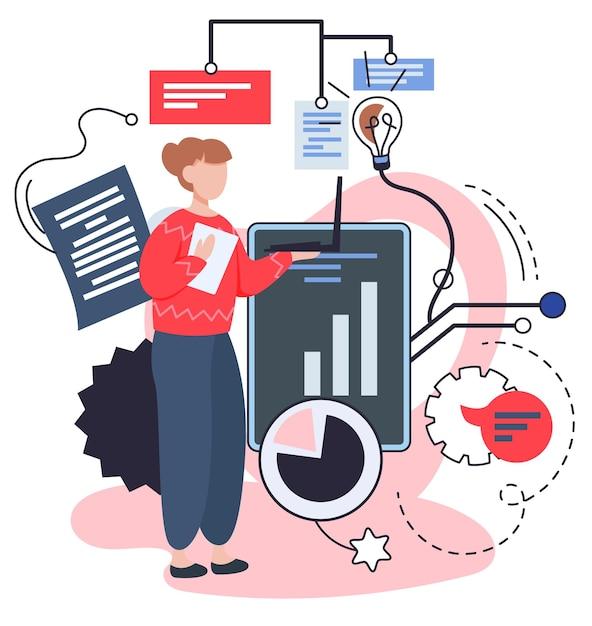In today’s fast-paced and complex world, having strong problem-solving and analytical skills is key to success. Whether you’re faced with a challenging work task, trying to make an important decision, or simply looking to enhance your cognitive abilities, developing these skills can make a significant difference.
But what exactly do we mean by problem-solving and analytical skills? Well, problem-solving involves the ability to identify, analyze, and find effective solutions to complex problems. It requires critical thinking, creativity, and a systematic approach. On the other hand, analytical skills refer to the capacity to gather and evaluate information, identify patterns and relationships, and draw logical conclusions.
So, why are these skills so important, and how can you improve them? In this blog post, we’ll explore the fundamentals of problem solving and analytical skills, debunk common misconceptions, and provide practical tips on how to sharpen your analytical thinking. Get ready to unleash your potential and conquer the challenges that lie ahead!

What Are Problem-Solving and Analytical Skills?
Problem-solving and analytical skills are the superhero duo of the professional world, capable of defeating any challenge that comes their way. These skills refer to the ability to identify, analyze, and solve problems using critical thinking and logical reasoning. They are highly sought-after by employers as they make you a valuable asset in any work environment. So, let’s dive into the realm of problem-solving and analytical skills and unravel their mysteries!
Unmasking the Problem-Solving Superpower
Problem-solving is like being a detective, but instead of solving crimes, you’re cracking the code of challenges that prevent progress. It involves breaking down complex problems into manageable pieces and finding ingenious solutions. Imagine yourself as Sherlock Holmes, with a magnifying glass in hand, examining every detail for clues.
The Analytical Mindset: Solving Problems with Style
Having strong analytical skills is like having a reliable sidekick in your problem-solving adventures. It’s a mental muscle that helps you gather, interpret, and evaluate information effectively. Think of it as having the power of a supercomputer in your brain, able to process vast amounts of data and uncover hidden patterns or insights.
The Power of Adaptability: Facing Challenges Head-On
While we may not have capes or x-ray vision, problem-solving and analytical skills enable us to adapt to different situations. No matter the industry or role, these skills allow you to approach problems from different angles, embracing change and innovation with open arms. It’s like being a chameleon, able to blend into any environment and find solutions that others may have overlooked.
The Art of Thinking Outside the Box: Creativity and Innovation
Problem-solving and analytical skills don’t just rely on logic and reasoning; they also embrace creativity and innovation. It’s often said that thinking outside the box is the key to unlocking novel solutions. So, imagine yourself as an artist, armed with brushes and a palette, ready to paint a masterpiece of problem-solving that dazzles the world.
The Dynamic Duo in Action: Real-Life Applications
Problem-solving and analytical skills are not confined to one industry or profession. They are versatile and can be applied to a wide range of scenarios. Whether you’re troubleshooting a technical glitch, devising a marketing strategy, or resolving conflicts in the workplace, these skills equip you to handle challenges with finesse and grace.
Sharpening Your Skills: How to Develop Problem-Solving and Analytical Abilities
Like any superhero, honing your problem-solving and analytical skills requires practice, patience, and a dash of perseverance. Engaging in activities that challenge your critical thinking, seeking feedback, and staying curious are all great ways to sharpen your mental blades and unlock the full potential of these skills.
Unleashing Your Inner Problem-Solving Hero
Now that you have a deeper understanding of problem-solving and analytical skills, it’s time to unleash your inner hero. Embrace challenges with confidence, practice your superpowers, and make a lasting impact in whatever field you choose. Remember, the world is waiting for your extraordinary problem-solving abilities!
So don your cape, grab your magnifying glass, and let the adventures of problem-solving and analytical skills begin! With their powers by your side, you’re ready to conquer the unknown and emerge as a champion of solutions in the ever-evolving world of 2023.

FAQ: What is problem-solving and analytical skills?
Is being analytical a bad thing
Being analytical is not necessarily a bad thing. In fact, it is a valuable skill that helps you assess situations, identify patterns, and make informed decisions. However, like anything in life, too much of a good thing can have its drawbacks. Being overly analytical can lead to overthinking and analysis paralysis. It’s important to strike a balance and use your analytical skills when they are most beneficial.
What are analytical problems
Analytical problems, also known as analytical thinking problems, require logical reasoning, observation, and critical analysis to find a solution. These problems often involve data analysis, pattern recognition, and the breaking down of complex information into simpler parts. They require you to think objectively and make connections between different pieces of information to arrive at a well-reasoned solution.
How can I improve my analytical thinking
Improving your analytical thinking skills is all about practice and honing your problem-solving abilities. Here are a few tips to help you enhance your analytical thinking:
- Challenge yourself: Seek out puzzles, brain teasers, or logic games to exercise your analytical muscles.
- Think step-by-step: Break down complex problems into smaller, manageable parts to understand them better.
- Ask questions: Develop a curious mindset and ask probing questions to delve deeper into problems.
- Evaluate alternatives: Consider multiple perspectives and potential solutions before settling on one.
- Seek feedback: Engage in discussions with others and listen to different viewpoints to expand your thinking.
Can you be creative and analytical
Absolutely! Creativity and analytical thinking are not mutually exclusive. In fact, they can complement and enhance each other. Analytical thinking helps you evaluate ideas critically, while creativity allows you to generate innovative solutions. By combining both approaches, you can approach problem-solving from multiple angles and come up with well-rounded solutions.
How can I be less analytical
If you find yourself constantly overanalyzing situations, there are a few strategies you can try to be less analytical:
- Practice mindfulness: Focus on being present in the moment and avoid getting lost in overthinking.
- Embrace spontaneity: Allow yourself to take risks and make decisions without overanalyzing every possible outcome.
- Engage in creative activities: Pursue hobbies or activities that encourage free thinking and imagination.
- Seek balance: Find a middle ground between being analytical and intuitive by trusting your instincts more.
What is critical creative thinking
Critical creative thinking combines critical thinking and creative thinking to approach problems in a holistic and innovative way. It involves analyzing information, evaluating evidence, and generating unique ideas. This approach encourages thinking outside the box while considering the practicality and effectiveness of potential solutions.
What is the difference between creative and critical thinking
While creative thinking focuses on generating imaginative ideas and solutions, critical thinking involves analyzing and evaluating those ideas. Creative thinking is more open-ended and emphasizes new possibilities, while critical thinking aims to objectively assess the viability and effectiveness of those possibilities. Both thinking styles are valuable and can be employed together to solve problems efficiently.
Is being analytical a good thing
Yes, being analytical is generally considered a valuable skill. Analytical thinking enables you to gather and interpret information, make better decisions, and solve complex problems. It allows you to approach situations with a logical mindset, evaluate different perspectives, and identify patterns and trends. Overall, being analytical can greatly contribute to your problem-solving capabilities.
What is the difference between analytical and critical thinking
Analytical thinking focuses on breaking down complex problems and making logical connections between different pieces of information. It involves gathering data, recognizing patterns, and drawing conclusions based on evidence. On the other hand, critical thinking involves evaluating the validity and reliability of arguments or ideas. It requires logical reasoning, questioning assumptions, and analyzing information to make informed judgments. While both thinking styles overlap in many ways, critical thinking dives deeper into the evaluation and assessment of ideas.
How do you solve analytical problems
To solve analytical problems effectively, follow these steps:
- Understand the problem: Gather all relevant information and identify the objective or desired outcome.
- Analyze the information: Break down the problem into smaller components and look for patterns, relationships, or trends.
- Generate potential solutions: Brainstorm different ideas or approaches that could address the problem.
- Evaluate the options: Assess the pros and cons of each potential solution objectively.
- Select the best solution: Choose the most viable and impactful solution based on your analysis.
- Implement and monitor: Put your solution into action and regularly evaluate its effectiveness.
What does it mean to be analytical
Being analytical means having the ability to approach situations and problems objectively while relying on rational thinking and data analysis. Analytical individuals often possess strong critical thinking skills, attention to detail, and the ability to spot patterns or inconsistencies. They strive to understand the root causes of problems, make evidence-based decisions, and thoroughly evaluate information before drawing conclusions.
What is problem-solving and analytical skills
Problem-solving and analytical skills refer to a set of abilities that allow individuals to identify, analyze, and solve problems efficiently. These skills involve logical thinking, the ability to analyze complex information, and make data-informed decisions. Problem-solving and analytical skills are crucial in various fields, including business, science, technology, and everyday life, as they enable individuals to overcome challenges and find innovative solutions.
